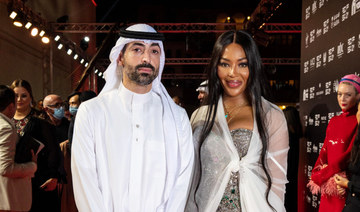JEDDAH: Lebanese filmmaker Joana Hadjithomas’ film “Memory Box,” based on her own life story, touched the hearts of many when it screened at the Red Sea International Film Festival in Jeddah.
The French-Lebanese production was born from a distant, but still vivid, memories of the Lebanese filmmaker.
“Memory Box” deals with the separation of two young Lebanese women — one in Paris and the other in Beirut — who write and send each other recordings every day for six years.
The two friends meet again in 2013 at an exhibition and discuss the notebooks and tapes that they gathered every day from 1982 to 1988.
Joana, who lives in Paris, retrieves her letters and tapes, which arouses the curiosity of her daughter Alia. Thanks to these letters and recordings, the latter discovers what her mother thought and said when she was her age.
For Hadjithomas, “conveying” is the keyword of this cinematographic adventure.
‘Khalil (Joreige) and I are artists; we worked a lot on the image and character of this film, paying attention to both its sound and pictorial dimension.’
Joana Hadjithomas, Lebanese filmmaker
“I wanted to tell a story of women and that of three generations of women,” the filmmaker told Arab News.
“I wanted to show another relationship to the war, away from the trauma, as seen in the eyes of the youth of the 1980s, driven by this crazy desire to live that was ours,” she said.
The film is a story of women, but, above all, a story of generations amid the disastrous civil war in Lebanon.
“When I received an invitation for the film, I did not hesitate. I said to myself: ‘I want to meet this generation’,” Hadjithomas said.
“Khalil (Joreige) and I are artists; we worked a lot on the image and character of this film, paying attention to both its sound and pictorial dimension. So we were keen to talk about the development of the film, to convey something of this experience,” Hadjithomas said.
Her eyes shine as she recalls how the film was received by the different audiences who had the opportunity to watch it.
“I feel overwhelmed every time,” she said. “Whatever their nationalities or background, people understood the movie.”
Hadjithomas added: “Maybe it is because the film sheds light on a myriad of experiences and a lot of details that I have taken from my notebooks; maybe also because we see my real notebooks in this film and there is a transition between fiction and reality. Maybe, finally, because it is a story of women and the actresses have put a lot of themselves into it.”
She added: “It is also a story of encounters. With Khalil, we met the actresses, we saw them, they inspired us.”
The filmmaker adds that the method of work she employs with her husband is not to give the film’s script to the actresses. This allows the actresses to bring originality, spontaneity and improvisation to the production.
Hadjithomas explains that the context in which the film was shot influenced the protagonists.
“When we shot the film, in 2019, we did not think that Lebanon would face what it experienced. For us, the film was a way to convey the past to the new generation. But with the huge crisis that ravaged Lebanon and led to its collapse, which culminated in the Aug. 4 port explosion, all of these factors led us to rework the film differently.”
Digging deep into her memory, Hadjithomas faces the fact that history seems to repeat itself 25 years later.
“In the film, the sentences that were spoken in the 1980s are so meaningful today that it troubles us. I think it also troubles people watching the film.”






















